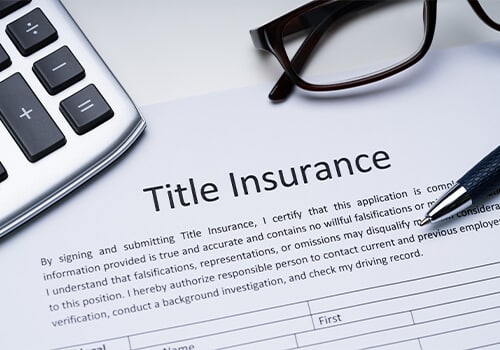If you have ever purchased real estate, you have probably heard of a title insurance policy. Can you imagine buying a house only to find out years later that you do not have a clear title to the property? This could be due to several reasons, such as improper execution of documents or missed tax liens.
Whatever the reason, this could be devastating and result in a significant financial loss if you did not own the property free and clear. A title insurance policy can help protect you and your lender (if you have a mortgage) from title defects. So, what exactly is a title policy, and what does it protect against? We will tell you everything you need to know about them, so keep reading.
What Is Title Insurance?
Many people wonder, “How does title insurance work?” Title insurance is a type of insurance coverage that protects either a lender or homebuyer from financial loss resulting from a defect in the title to the property.
Protection
This insurance policy protects against title issues caused by previous acts. When purchasing title insurance, you pay only one single premium. This protects you from all prior acts that may have encumbered the title. These acts could have been committed by the prior owner or perhaps even many years and several owners ago.
Research Title History
The title insurance company will conduct a title search when purchasing a title insurance policy. This means that a title agent with the insurance company will research the title to the property to identify any potential title problems. They attempt to ensure that your property ownership is not affected by any potential title problems.
Ownership Disputes
When buying real property, you want to ensure total ownership rights. If a previous owner were to come forward and claim ownership rights, then you might end up in a legal battle at the least. At worst, you might lose the property you thought you had purchased. When you buy title insurance, it helps to ensure there are no issues with property ownership, and it protects you from financial loss if any problems arise in the future.
KEY TAKEAWAYS
- Title Insurance is a type of insurance coverage that protects a lender or homeowner from financial loss resulting from a defect in the title to a property.
- There are two primary title insurance. Mortgage lenders typically require lender title insurance, while owners title insurance is optional but will benefit the homeowner.
- A title insurance policy will protect against easement rights disputes, tax liens, judgments, and fraudulent documents.
Types Of Title Insurance Policies
Believe it or not, there is more than one type of title insurance policy. While the two different kinds function much the same way, the protection they offer is different. Whether or not you have a mortgage on your home affects which type you need to purchase. Let’s dive into the two different kinds of policies.
Lender’s Title Insurance
You must buy a lender’s policy if you use a mortgage loan company to purchase your new home. Almost every mortgage lender has a loan policy requiring you to buy a lender’s policy when purchasing your home. Otherwise, their underwriters will not approve the closing of your loan. This even applies when refinancing a loan, regardless of your debt-to-assets ratio. This protects their financial interest in the property. It provides coverage to protect them against financial loss from prior title defects and ensures the lender has a valid and enforceable lien on the property after the purchase. This type of policy provides no coverage for the borrower.
Owner’s Title Insurance
It is a good idea to purchase an owner’s title insurance policy, regardless of whether you must buy a lender’s title insurance policy. In many real estate transactions, the seller will purchase an owner’s policy for the buyer and pay for it as part of their closing costs. If any prior acts or title defects result in a financial loss to the owner, you may file a claim against the policy and get reimbursed up to the policy’s coverage amount.
Must read articles related to Personal Finance
- Eight ways to maximize your Social Security benefits.
- Making sense of debt-to-asset ratios.
- Learn about the differences between a living trust and a will.
- How to identify & avoid Social Security Scams?
- How to protect your personal information from being stolen.
What Does Title Insurance Cover?
So, precisely what does title insurance do? What could even go wrong with ownership of property? While the title agent will thoroughly search the public records to identify any potential issues, some may not arise until years after they have occurred. Here are some of the most common issues covered by title insurance.
Easement Rights
First, most policies cover situations where easements or encumbrances affect the property. These easements may not have been adequately recorded previously, and the new owner might not know about them until years later.
Tax Liens and Judgements
Next, most policies will cover old tax liens or other judgments against the property. Perhaps there are unpaid taxes on the property, and a lien was filed against the property. Your title insurer will usually cover the cost of these back property taxes. In most cases, the policy amount can go up to the purchase price of your home.
Fraudulent Documents
Finally, most policies will cover illegal deeds – even fraudulent documents. They will also cover missing or unknown heirs to the property from prior owners. Perhaps the heirs were not correctly identified when the property went through probate. This is not an exhaustive list, so you should always refer to your insurance agent or real estate agent to determine exactly what your specific policy covers.
Non-Covered Issues
So, what does title insurance not cover? Typically, your policy will not cover any acts after the policy is issued. Most policies only cover prior acts before the policy was issued. In addition, they generally do not cover any issues arising from you not paying your mortgage. Again, check your specific policy for details on coverage.
TIP
You often hear the term title insurance when you apply for a mortgage on a home. However, even when paying cash for a home, you should buy owner’s title insurance to protect yourself against potential issues.
Cost Of Title Insurance
Title insurance cost varies based on a few different factors. First, the property’s purchase price is a significant factor in the cost of your policy. The higher the property value and purchase price, the more the policy will cost.
Next, the state in which you live can affect the price of your one-time premium. Remember that you only pay one premium when purchasing this type of policy. On average, title insurance typically costs 0.5% to 1% of the home’s purchase price. A lender’s policy and a $350,000 home will cost you around $1,400. An owner’s policy will set you back just a little more – on average, an owner’s policy will cost about $1,750.
The Bottom Line
If you are purchasing property, you will definitely want to buy title insurance. These policies help to protect your financial interest in ownership of a property and against title defects like unknown liens, missing heirs, or unrecorded easements.
Sometimes, the seller might provide a warranty for the title, but your mortgage company will require a lender’s policy. This even applies when you refinance your home because the original lender policy is only suitable for the life of the loan.
The cost of a policy is relatively small compared to the amount of money you spend on a home, so make sure you purchase one to protect yourself.
Frequently Asked Questions
Yes! You need to purchase title insurance when you buy property. If you are using a lender, they will almost always require you to buy a lender’s policy. However, you should go ahead and make sure that you have an owner’s policy as well.
You never know what issues might arise that could encumber your ownership of the property, so these policies can protect you if surprises happen in the future.
Many people ask, “What is title insurance for a house?” They might think it is the same as homeowners insurance, but it is not. Title insurance protects your financial interest in the ownership of the property from title defects, while homeowners insurance protects your property from physical damage or accidents.
For example, a homeowners policy would protect you if your home was damaged in a storm. On the other hand, a title policy would protect you if someone claims they are the heir of a previous owner and they rightfully own the property.
You could suffer severe financial consequences if you do not have title insurance. Suppose that someone else comes forward and claims they own the property. You might be forced to go through a legal battle and pay all the legal fees.
Worse yet, the court might decide the other person rightfully owns the property. Without a title policy, you have likely lost the entire purchase price you paid for the property. With a policy, your insurance company would cover this title defect, and you could file a claim with the insurance company for the purchase price to recoup the money you lost.
You can find a Social Security Administration office near you by using our SSA office locator and searching for your closest location.





